2020 Annual Report for: Eriocraniidae / Eriocraniinae
For species seen in 2020 that had less than or equal to 100 records, full details are included; for more common species, the earliest, latest and highest count by vice-county are shown. The narrative for each species is taken from the main Hantsmoths website, and it is possible that some information on abundance and occurrence can get out of date, as it is impossible to keep up with all changes; however it should give a good introduction to each species. The tables in each species account summarise the previous status, and that for the current year.
For the maps, all records prior to 2020 are shown by a blue dot (the larger the dot, the more recent), with the current year's records shown in red. As previous records are superimposed on any report for 2020, new sites have greater emphasis (i.e. will show as 'more red').
In the species accounts, an asterisk next to a location indicates a new 10km square record; earliest ever dates are highlighted in orange, and latest ever in red. Initials in the species accounts refer to the recorders listed here. Please get in touch if you identify any omissions or errors, in particular if you have records that have yet to be submitted. Details of how to submit records can be found here.
02.001 [B&F: 0006] Dyseriocrania subpurpurella (Haworth, 1828) - Common
Common in oak woodland throughout the British Isles, excluding northern Scotland. Well distributed and fairly common, sometimes abundant, in Hampshire and on the Isle of Wight, wherever there are oak trees. Wingspan 9-14 mm; a diurnal species which is also attracted to light, in dull weather it rests on the trunks and branches of oak trees. The metallic gold forewing is speckled with minute purple or blue spots. Larva mines leaves of Oak, over-wintering as a pupa.
Records prior to 2020
| Vice County | #Records | #Individuals | First Record | Last Record |
|---|---|---|---|---|
| 10 | 93 | 102 | 1948 | 2019 |
| 11 | 626 | 1392 | 1972 | 2019 |
| 12 | 354 | 777 | 1940 | 2019 |
2020 records
| Vice County | #Records | #Individuals | Max Quantity |
|---|---|---|---|
| 10 | 15 | 61 | 11 |
| 11 | 9 | 17 | 5 |
| 12 | 7 | 11 | 5 |
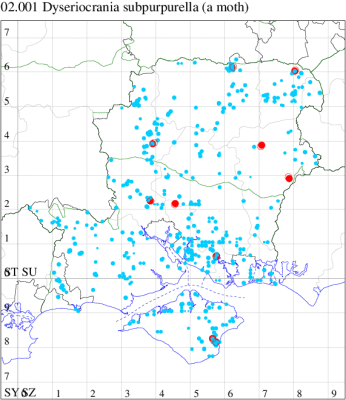
Records by year
Records by week (adult)
Records by week (larval)
Record Details
VC10: America Wood, eight, 06 Apr; larva, one, field observation, blotch mine in Pedunculate Oak, 11 May; Shanklin, one, 31 Mar; seven, 05 Apr; one, 06 Apr; one, 07 Apr; nine, 09 Apr; two, 10 Apr; four, 11 Apr; two, 14 Apr; three, 16 Apr; one, to actinic, 19 Apr; nine, 20 Apr; 11, 21 Apr; one, 22 Apr (IOu);
VC11: Romsey, five, 05 Apr (NRJ); Eastleigh, one, to actinic, 09 Apr; one, to actinic, 10 Apr (KArb); Allbrook, three, 11 Apr; one, 18 Apr (SI); Fareham, one, to actinic, 10 Apr (MLO); Sway, one, 10 Apr (SKe);
VC12: Chilbolton, one, to actinic, 11 Apr (GCE); Pamber Forest, one, 10 Apr (GJD); Liss Forest, one, 10 Apr; one, 10 Apr; five, 13 Apr (RJM); Alton, one, to actinic, 16 Apr (BCA); Yateley, one, 23 Apr (JHH)
02.002 [B&F: 0007] Paracrania chrysolepidella (Zeller, 1851) - Local
Local in woodland, hedgerows and scrub in southern England and also the Burren in Ireland. In Hampshire very local in deciduous woodland, particularly from Botley Wood in the 1970s, but there have been no mainland records for over a decade. A first record from the Isle of Wight in 2020 was therefore a surprise. Wingspan 9-13 mm. Very similar to E. cicatricella from which separated only by dissection of the genitalia. Larva mines leaves of Hornbeam and Hazel, over-wintering as a pupa.
Records prior to 2020
| Vice County | #Records | #Individuals | First Record | Last Record |
|---|---|---|---|---|
| 11 | 22 | 50 | 1974 | 2010 |
| 12 | 3 | 5 | 1993 | 2004 |
2020 records
| Vice County | #Records | #Individuals | Max Quantity |
|---|---|---|---|
| 10 | 1 | 1 | 1 |
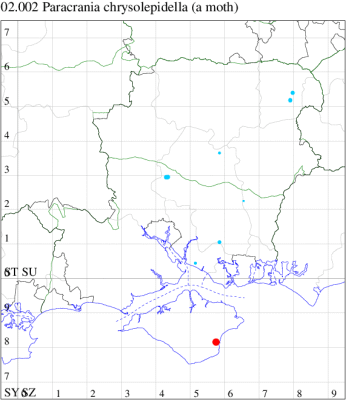
Records by year
Records by week (adult)
Records by week (larval)
Record Details
VC10: New Vice-county Record: Shanklin*, one, gen det, 02 Apr (IOu)
02.003 [B&F: 0008] Eriocrania unimaculella (Zetterstedt, 1839) - Local
Local in birch woodland throughout most of Britain. In Hampshire and on the Isle of Wight local and evidently rather uncommon amongst birch, most frequently in southern Hampshire. Wingspan 9-11 mm. This species is most easily distinguished from other Eriocrania by the conspicuous silvery tornal spot, which in most other species is pale golden (MBGBI Vol 1). Larva mines leaves of Birch, over-wintering as a pupa.
Records prior to 2020
| Vice County | #Records | #Individuals | First Record | Last Record |
|---|---|---|---|---|
| 10 | 3 | 3 | 1932 | 2009 |
| 11 | 40 | 25 | 1964 | 2016 |
| 12 | 11 | 14 | 1976 | 2018 |
2020 records
| Vice County | #Records | #Individuals | Max Quantity |
|---|---|---|---|
| 12 | 3 | 6 | 4 |
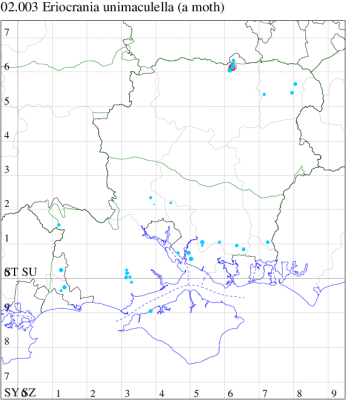
Records by year
Records by week (adult)
Records by week (larval)
Record Details
VC12: Pamber Forest, one, 05 Apr; one, 10 Apr; mine, four, 21 Apr (GJD)
02.004 [B&F: 0009] Eriocrania sparrmannella (Bosc, 1791) - Local
Local in birch woodland throughout the British Isles. In Hampshire and on the Isle of Wight local and evidently rather uncommon amongst birch, most frequently in southern Hampshire. Wingspan 10-13 mm. E. salopiella has a similar pattern and wing shape but is normally suffused with purple and bright blue (MBGBI Vol 1). Larva mines leaves of Birch, over-wintering as a pupa.
Records prior to 2020
| Vice County | #Records | #Individuals | First Record | Last Record |
|---|---|---|---|---|
| 10 | 9 | 0 | 2009 | 2015 |
| 11 | 46 | 45 | 1973 | 2015 |
| 12 | 9 | 3 | 1998 | 2012 |
2020 records
| Vice County | #Records | #Individuals | Max Quantity |
|---|---|---|---|
| 12 | 1 | 0 | 0 |
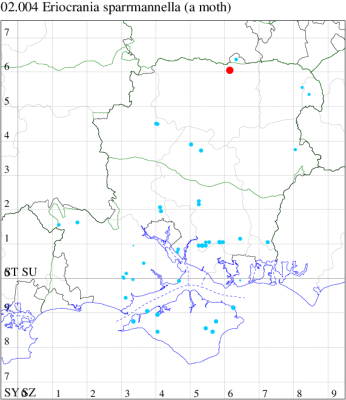
Records by year
Records by week (adult)
Records by week (larval)
Record Details
VC12: Pamber Forest, mine, present, many mines on birch, 08 Jun (GJD)
02.005 [B&F: 0010] Eriocrania salopiella (Stainton, 1854) - Local
Local in birch woodland throughout Britain, with a scattered, discontinuous distribution. Erratically distributed in Hampshire and on the Isle of Wight, with notable populations around Fleet Pond, Botley Wood and Havant Thicket, but almost certainly under-recorded. Wingspan 9-12 mm. Day-flying. Adults difficult to distinguish from other Eriocrania species, and more frequently recorded in the larval stage, when mines are relatively easy to find where they are present. Larva mines leaves of Birch, over-wintering as a pupa.
Records prior to 2020
| Vice County | #Records | #Individuals | First Record | Last Record |
|---|---|---|---|---|
| 10 | 8 | 5 | 2003 | 2014 |
| 11 | 43 | 24 | 1974 | 2015 |
| 12 | 29 | 16 | 1976 | 2019 |
2020 records
| Vice County | #Records | #Individuals | Max Quantity |
|---|---|---|---|
| 12 | 2 | 3 | 3 |
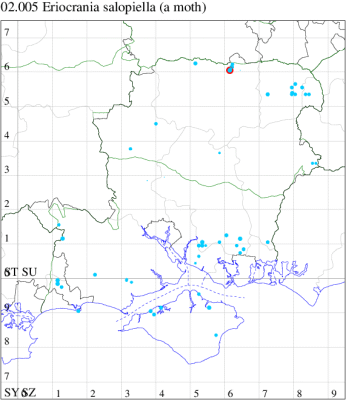
Records by year
Records by week (adult)
Records by week (larval)
Record Details
VC12: Pamber Forest, mine, three, 20 May (GJD)
02.006 [B&F: 0011] Eriocrania cicatricella (Zetterstedt, 1839) - Local
Local in birch woodland throughout Britain. In Hampshire and on the Isle of Wight widely distributed, but not particularly common. Wingspan 9-13 mm. Day-flying. Very similar to E. chrysolepidella and only reliably separable by dissection of the genitalia. Larva mines leaves of Birch, over-wintering as a pupa.
Records prior to 2020
| Vice County | #Records | #Individuals | First Record | Last Record |
|---|---|---|---|---|
| 10 | 8 | 3 | 1933 | 2015 |
| 11 | 47 | 58 | 1971 | 2014 |
| 12 | 18 | 10 | 1991 | 2007 |
2020 records
| Vice County | #Records | #Individuals | Max Quantity |
|---|---|---|---|
| 10 | 1 | 1 | 1 |
| 12 | 2 | 3 | 3 |
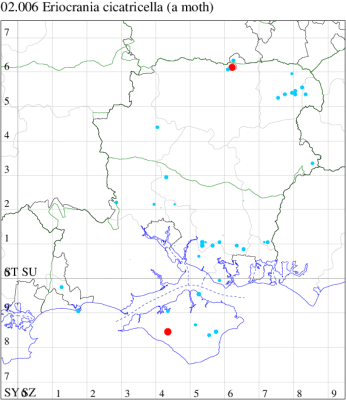
Records by year
Records by week (adult)
Records by week (larval)
Record Details
VC10: Brighstone Forest*, one, netted, gen det, 16 Mar (IOu);
VC12: Pamber Forest, mine, three, on birch, 16 Apr (GJD)
02.007 [B&F: 0013] Eriocrania semipurpurella (Stephens, 1835) - Common
Common in birch woodland throughout the British Isles. Fairly widely distributed in Hampshire and on the Isle of Wight, where it is the most common of the six birch feeding Eriocrania species. Wingspan 9-14 mm. Day-flying. Very similar to E. sangii, from which separated only by dissection of the genitalia. Larva mines leaves of Birch, over-wintering as a pupa.
Records prior to 2020
| Vice County | #Records | #Individuals | First Record | Last Record |
|---|---|---|---|---|
| 10 | 11 | 9 | 1932 | 2019 |
| 11 | 78 | 83 | 1971 | 2019 |
| 12 | 34 | 46 | 1975 | 2018 |
2020 records
| Vice County | #Records | #Individuals | Max Quantity |
|---|---|---|---|
| 11 | 1 | 1 | 1 |
| 12 | 2 | 4 | 3 |
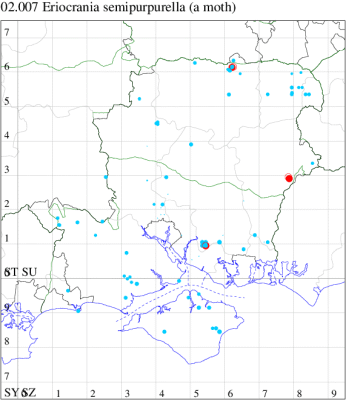
Records by year
Records by week (adult)
Records by week (larval)
Record Details
VC11: Botley Wood, one, 17 Mar (KJW);
VC12: Pamber Forest, mine, three, three tenanted mines, 21 Apr (GJD); Liss Forest*, one, 10 Apr (RJM)
02.008 [B&F: 0012] Eriocrania sangii (Wood, 1891) - Local
Local in birch woodland throughout much of Britain. In Hampshire and on the Isle of Wight widely distributed, but not particularly common. Wingspan 9-14 mm. Day-flying. Can only be separated from E. semipurpurella by dissection of the genitalia. Larva mines leaves of Birch, over-wintering as a pupa.
Records prior to 2020
| Vice County | #Records | #Individuals | First Record | Last Record |
|---|---|---|---|---|
| 10 | 9 | 3 | 1994 | 2014 |
| 11 | 51 | 33 | 1963 | 2018 |
| 12 | 24 | 21 | 1976 | 2018 |
2020 records
| Vice County | #Records | #Individuals | Max Quantity |
|---|---|---|---|
| 12 | 2 | 1 | 1 |
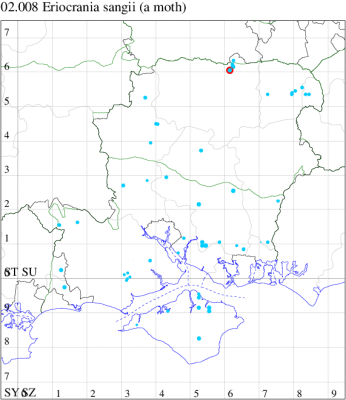
Records by year
Records by week (adult)
Records by week (larval)
Record Details
VC12: Pamber Forest, mine, one, 20 May (GJD)